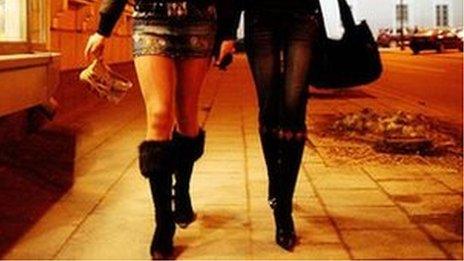Sex workers protest at Stormont during the debate to criminalise the purchase of sex
- Published

The vote on criminalising the purchase of sex is due on Monday but may run over to Wednesday.
Victims of trafficking forced into sex work will become harder to uncover if paying for sex is criminalised, protesting sex workers said on Monday.
A small group of sex workers staged a protest at the gates of Stormont while MLAs debated the issue.
Clause six of Lord Morrow's Anti-trafficking bill will, if passed, make paying for sexual services illegal.
It is intended to curb the market for prostitution.
However, sex worker and campaigner Laura Lee said that the police are often informed of suspected trafficking cases by their clients.
"Clients won't report it to the police if they face admitting they've committed a crime," she said.
Ms Lee denied that sex workers' objections to the bill are motivated by fear of losing income.
Similar legislation has been enacted in Sweden and Ms Lee said: "This is going to hit the most vulnerable sex workers.
"We know that from evidence from Sweden, where sex workers take greater chances, for less money."
Former victim
Supporters of the bill include a former victim of trafficking known as 'Anna'.
The Romanian was abducted from London and forced into sex work for nine months in the Republic of Ireland and Northern Ireland.
She refuted claims that the proposed legislation would drive trafficking underground.
"This is already underground, The only thing that will go underground would be the sex industry which would have to lose their major income," she said.
First in the UK
For operational reasons the PSNI were unable to confirm if previous victims of trafficking were discovered due to tip-offs from clients.
The bill is due to be voted on late on Monday evening, although the debate may roll over to Wednesday. It is thought there is enough cross party support for it to pass.
If passed by Stormont, Northern Ireland will be the first part of the United Kingdom where the purchase of sex is made illegal.
- Published17 October 2014

- Published20 October 2014
